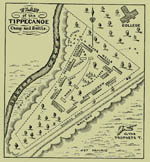War of 1812 Battles |
Colonial Wars |
American Wars |
Battle of Tippecanoe
November 7, 1811, Tippecanoe, Indiana Territory
Books on The Battle of Tippecanoe are available from Amazon.com
 |
|||||||||||||||||||||
|
The Battle of Tippecanoe was a decisive victory by American forces led by then-Governor of the Indiana Territory William H. Harrison over the forces of Chief Tecumseh's growing American Indian confederation. The battle took place outside Prophetstown and was part of what is sometimes known as Tecumseh's War, which continued into the War of 1812.
While Tecumseh was in the southern U.S. enlisting support for his confederacy, Harrison moved up the Wabash River towards Prophet's Town with 1,000 men. This force was a combination of U.S. Army soldiers, Indiana militiamen and eager volunteers from Kentucky where Indian fighting was a glorious tradition. A dozen miles from the native village, Harrison stopped and sent out scouts. Upon arriving at the site, Harrison warned his men of the possible treachery of the Prophet, Tecumseh's brother. Tecumseh left Prophetstown under the leadership of his younger brother, Tenskwatawa, also known as the Prophet.
When Harrison's forces came into view late on November 6, a young Indian on horseback rode out from the town waving a white flag. He carried a message from the Prophet requesting a cease fire until the next day when the 2 sides could hold a peaceful meeting. So Harrison and his men set up camp one mile away from town. Fearing Tecumseh's imminent return with reinforcements, Harrison ordered his men to fortify their position. Although Tecumseh had warned Prophet not to attack the Americans until the confederation was strong and completely unified, the incensed Prophet lashed his men with fiery oratory.
Claiming the white man's bullets could not harm them, the Prophet led his men near the army campsite. The native warriors were certain that Harrison's forces intended to attack them regardless of negotiations, so they decided to attack first. From a high rock ledge west of the camp, he gave an order to attack just before daybreak on November 7. The sentinels were ready, and the first gunshot was fired when the yells of the warriors were heard. Many of the men awoke to find the Indians upon them. By the time Harrison realized what was happening, his men were falling all around him. By daybreak, the entire American line was engaged and the warriors begin to falter. After a final charge from the flanks, the Prophet's force was depleted of ammunition and they had to retreat across the marshy prairie.
Two hours later, the battle was over. The Indians had their spirit crushed. Angered by his deceit, the weary Indians stripped the Prophet of his power and threatened to kill him. Harrison, expecting Tecumseh to return with a large band of Indians, fortified his camp soon after the battle. No man was permitted to sleep the following night. Taking care of their dead and wounded, the demoralized Indians left Prophet's Town, abandoning most of their food and belongings.
The next day, November 8, he sent a small group of men to inspect the town. Accounts differ as to what happened next. The soldiers claimed to find the town deserted except for a single elderly woman. Other accounts claim a number of women and children were slaughtered. Two days later, Harrison's men plundered Prophet's Town and then burned it to the ground and began their painful return to Vincennes. Harrison portrayed the battle as a victory for settler's rights and won instant national fame.
The defeat was a crushing blow, but did not destroy, Tecumseh's dream of a unified Indian confederacy. The Prophet, having prophesied that the weapons of Harrison's men would not be able to hurt his warriors, was disgraced by his failure and fled to Canada. Many First Nations people were so incensed by Harrison's tactics that they joined forces with the British military to fight against the Americans.
Although this battle was crushing, it was not until 1813 at the Battle of the Thames and the death of Tecumseh that his confederation was eliminated.

